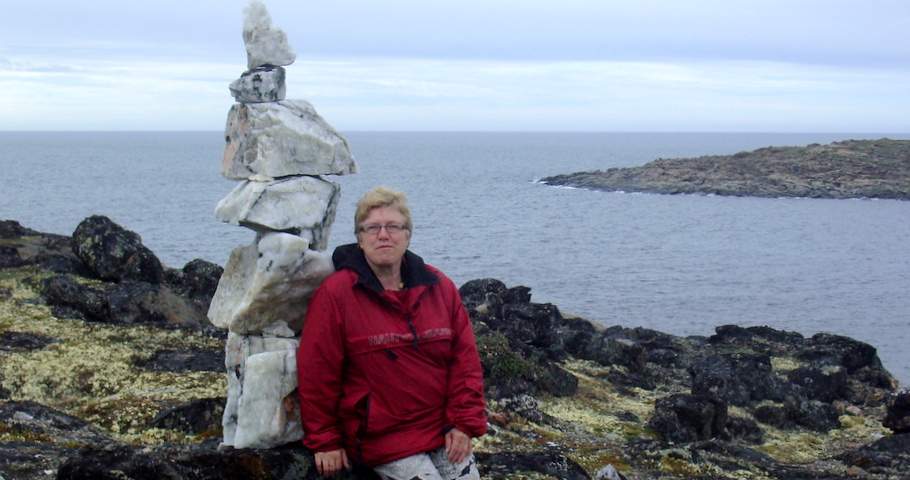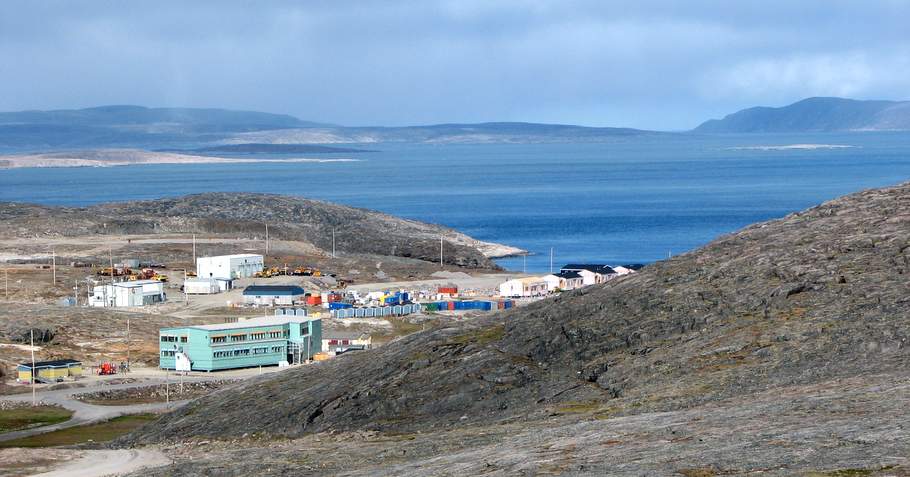I define social support as “an exchange of resources“ between two individuals intended to enhance the well-being of the recipient. The costs and benefits of the exchanges between the two participants are linked to the resources of either. Different factors can influence support effects and suggests a broad range of outcomes for both the provider and the recipient.
There are five types of social support this project has received: sources of social support provide emotional support. Referred to as "esteem support", this type of emotional support lets the individual know that he or she is valued.
1- Emotional support is the offering of warmth and nurturance. Anyone who has heard my focused and impassioned speech on the Inuit realities and what the Inuit women (Saturviit) are doing to straighten out their situation has offered empathy, concern, trust, acceptance, encouragement, and much caring.
2- Social support can make assistance available, or ensure a degree to which a person is integrated into a social network. These supportive resources can be emotional (e.g., nurturance, aiding, backing,), tangible (e.g., shelter, financial assistance), informational (e.g., advice, counsel, marketing, feedback, coaching), or companionship (e.g., sense of belonging) and intangible (e.g., personal advice).
Companionship support is the type of social support that gives someone a sense of belonging. This can be seen as the presence of companions to engage in shared social activities.
Support can come from many sources, such as family, friends, strangers, neighbors, coworkers, organizations such as churches, friendship centers, walking clubs, music clubs, social clubs, etc.
3- Tangible support is the provision of financial assistance, material goods such as shelter, food, gas, skills, or services. Also called instrumental support, this form of social support is a concrete,
and a direct way people assist others.
4- Informational support is the provision of advice, guidance, suggestions, or useful information to someone. This type of information has the potential to help others problem-solve.
5- Structural support or functional support refers to the extent to which a recipient is connected to a social network, like the number of social ties or how integrated a person is within his or her social networks. The Inuit on my Facebook page, family relationships, friends, and membership in clubs and organizations, all contribute to my social integration.
To resume I would say that the dimensions of support different from the contextual variables can influence its quality and effectiveness. For example, mayors who have no Indigenous population in their fold cannot and will not extend the same degree of acceptance as those mayors who must learn to work with and for this population.
The communications plan
One of the most important aspects of a project plan is the communications plan. Although a plan can be changed, it is important to develop different scenarios for a successful mix of resources and strategies to keep the project on track.Such a project requires the input of many people. So I try to convey the 'shape' of the project to the people I meet, I also try to identify the values it will need to produce results as well as evaluate its constraints, dependencies, and risks.
2017 Support
January 4th, 2017-Interview at Villa Pierrot with the executive director, Lise Cadieux.January 13th, 2017-Posting reports to the Ministry of Department of Indian Affairs and Northern Development and Saturviit.
February 3rd, 2017-Particpation at Pauktiitut Inuit Women of Canada.
February 24th, 2017-Visit to inform a family about my project No Child Should Take the Long Way Home.
March 8th, 2017-Participation in International Women's day activities at the Centre des femmes de Saint-Laurent.
April 16th, 2017- Presentation of my project of the 8000-kilometer trek to individuals of Dodge Cove, BC at a community picnic.
April 18th, 2017-Interview on the subject of Inuit realities with Carolina De Ryk, Prince Rupert, BC.
April 26th, 2017-Byline on my activity on Stony Plain library’s web page and presentation to a spontaneous audience at same library.
April 26th, 2017-Meeting with Deborah K., a resident of Spruce Grove who offered warm shelter and much caring.
April 29th, 2017-Exchange on solutions offered to Inuit men from Northwest Territories with a staff member of ‘I have a chance‘ in Spruce Grove.
May 2nd, 2017 Departure from Edmonton, walking on 2A toward Ponoka.
May 6th, 2017 Exchange on solutions offered to men with Gordon Liddie, of
May 10th, 2017 Meeting with Nadette Agecoutay at Red Deer Native Friendship Centre and signature of the petition. Given information to the effect that Red Deer Town Counsellors and First Nations were to sign a protocol to determine how to work together. That is what I consider actions toward reconciliation.
May 13th, 2017 Return by car to Canmore so that Grant and Candace can follow me across the rest of Alberta.
May 19th, 2017 Interview by a local journalist, M. Parker at Brooks Museum.
May 21st, 2017 Meeting of Mysty Dawn Merrier in Canmore to talk about gender problems.
May 23rd, 2017 Phone conversation with Mayor Tara Veer of Red Deer to congratulate her on reconciliation efforts to take place on June 21st, 2017.
May 26th, 2017 Meet-up with Barry B and Monika G. for an extended stay in Medicine Hat. Barry’s invitation gave me the opportunity to revise my marketing strategy. Monika’s talents were put to the test as she took me everywhere in town.
May 27th, 2017 Conference at Franco-Albertan Women’s Club. I start exposing why I am doing this project and then I tell them of what I witnessed.
May 27th, 2017 Presentation of my project at an assembly of women for the elaboration of cooked meals.
May 29th, 2017 Meeting councillor Leslie Pearson at Medicine Hat City Hall to talk about reconciliation.
June 2nd, 2017 Participation at Round Dance of Blackfoot people in Lethbridge who contribute foodstuff galore.
June 8th, 2017 Presentation at a family meeting, the Campbells, to talk about Inuit realities. Long walk with 4 family members to celebrate my project No Child Should Take the Long Way Home.
June 9th, 2017-Presentation to a group of volunteers of Prairie Gleaners in Medicine Hat.
June 10th, 2017- Thanks to Jeannette Hansen and her staff at Miywasin Friendship Center, I am offered the opportunity to do a presentation to many individuals at an Indigenous musical event taking place at Eagle's Nest Ranch, Medicine Hat (The Hills are Alive) to invite people to sign the petition addressed to Prime Minister Trudeau.
June 12th, 2017-Presentation to a spontaneous audience at Swift Current Library-7 women are present.
June 14th, 2017- Presentation in a family setting in Shawnavon, Saskatchewan.
June 21st, 2017-Conference at the Assembly of First Nations' Day in Moose Jaw, Saskatchewan, to invite people to sign the petition addressed to Prime Minister Trudeau.
July 9th, 2017- As part of a fundraiser for the Villa Pierrot in Magog, I took part in a 3h sailing trip with other volunteers and participants on the majestic Lake Memphremagog from Lestage beach.
2016 Support
In January 2016, we are planning a major shift for the project No Child Should Take the Long Way Home.In February 2016, there is a move to evaluate the needs of one Nunavik population and their existing resources. Funding is a major aspect for this to happen.
In early March 2016, participation as a conference leader at the Centre des femmes de Saint-Laurent also led me to participate with the women on Women's day on March 8th. A Manifesto was read to the politicians we visited.
A meeting with director Marissa Kokkoros of f Aura Freedom International in Toronto was deemed necessary before departure to ensure full participation in A Life of Dignity for Inuit Women and Children.
On April 1st, 2016, a conference at Café Rico in Montreal launched my departure out West. I arrived in Prince Rupert on April 9th and visited the Friendship Center and met with Denisiqi Services Society where I left a petition to be signed by their members.
Mid-April, 2016, departure from Prince Rupert heading for Fort Fraser, Vanderhoof and Prince George where the goal was to have the petition signed.
My arrival in Williams Lake on April 22nd, 2016, before heading for Squamish and Lilloett provided an opportunity to meet with reporter Monica Lamb-Yorski of the Williams Lake Tribune. In Squamish, I found native communities stuck in poverty and lacking in decent housing. In Lilloett, people are looking to create a different economy and I heard about cooperatives, local foods hubs, and businesses.
On April 29th, 2016, after participating in a meeting with mayor Helps, friends came from Courtenay to launch my trek from Victoria on the Island of Vancouver.
By May 7th, 2016, I had walked to Chemainus where a friend lived and I was enrolled in giving a conference on May 29th at Seaside Yoga Center.
May 10th, 2016, I met Denis R. Ranger of Nature Watch Studio. He volunteered to do a documentary on my 8000-trek. We have made two segments while on the Island of Vancouver.
June 15th, 2016-Going back and forth between Duncan and Chemainus, I was invited to the community picnic and annual general meeting of Cowichan Women Against Violence who have been providing services for women and families affected by abuse for 35 years. Thanks to Jane Sterk, executive director, I also volunteered for 3 days at Cowichan Women Against Violence. At the same picnic, I also met NDP's own Georgia Collins with her environmental angle.
June 17th, 2016-Thanks to my friend Mary Beth, I met Angie Underwood of the Cowichan tribes at the picnic, was invited to a supper in the Ts'i'ts'uwatul' Lelum Elders House on the reserve and gave a short talk on my project and the reasons for walking 8000 kilometers.
June 25th, 2016-The Indigenous Women's forum in Duncan, BC bring my actions to its logical end on the Island of Vancouver.
June 28th, 2016- Meeting with Grant and Candace of Canmore. They will be driving behind me in a caravan as soon as I get to Alberta. Grant volunteered as long as he could bring his wife and a shepherd dog.
July 21, 2016-Conversation with Bishop Logan McManamie in regard to the plight of mothers in Inuit land. He forwarded the names of church dioceses I should contact.
August 3rd, 2016-Interview with Marie Villeneuve-follow-up on Phare Ouest on the subject of my 8000 kilometer-trek. Have done 1377 km. at that point.
August 3rd-Meeting with Kystie Singh at SOS CHILDREN'S VILLAGE in Surrey. Nice to see it at work.
August 4th, 2016-Meeting with executive director Linda Day of Aboriginal Women Center Society. Very nice spacey and most useful work.
August 6th,2016- Friendship Center Society. Meeting Mrs. Susan Tatoosh is a most welcomed event.
August 8th, 2016-Meeting Andrea Reimer at City Hall. Andrea Reimer of Gregor Robertson's team is responsible for Reconciliation with Aboriginal Peoples: This important initiative engages citizens of all backgrounds in meaningful dialogue to address past injustice to Aboriginal Peoples and pathways to a future which supports the rights and aspirations of Aboriginal Peoples living in Vancouver – the unceded traditional territory of the Squamish, Musqueam, and Tsleil Waututh nations.
August 10th, 2016-Meeting with MLA of BC, Melanie Mark (Melanie Mark is a Canadian politician, the first First Nation woman elected to the Legislative Assembly of British Columbia; she is a British Columbia New Democratic Party MLA representative for Vancouver-Mount Pleasant). Her acknowledgment that the work with children is a Canadian issue is important for my project No Child Should Take the Long Way Home.
August 10th, 2016-Meeting with Mark Gifford of Foundation Vancouver (Fostering Change: Shared Leadership Required For Youth From Foster Care)
August 15th, 2016-Meeting with Mayor Sharon Gaetz of Chilliwack. She makes possible meetings with First Nations on this territory.
September 8th, 2016- Meeting with Mayor Henry Braun of Abbotsford. He is working on developing good working relationships with the two Nations on the Abottsford territory.
September 26th, 2016-Meeting with stand-in Mayor Tina Lange of Kamloops. She contributes many ideas relating to Justice and its treatment.
October 4th, 2016-Participation in Amnesty Int'l activities in Ottawa.
October 14th, 2016-Visit at my deputy's office-Magog.
October 17th, 2016 to 20th-Visit in Brampton.
November 11th, 2016- Meeting with Annie Baron of Saturviit Inuit Women Association in Quebec City.
November 17th, 2016-Interview with Jean-François Gagnon (follow-up regarding my walk).
December 7th, 2016-Publication of the article regarding my walk for La Tribune.
2015 Support
Following the conference at Amnesty International (group 102), the group allows me to name them as support.The director of the Villa Pierrot, Lise Cadieux, gives her personal endorsement to help me file for the foundation Lorraine Loranger: a consultation with her CA will or will not allow the logo on my blog.
A visit to the Mayor of Magog, Quebec, Vicki May Hamm opens doors for me to the Canadian Federation of Municipalities.
The Municipality of North Hatley and St Catherine de Hatley, their mayors, Jacques Demers and Michael Page (July 6th 2015-08-06-Resolution no. 2015-07-104) lend me a room on request for conferences and exhibition.
A group of women invited by Sylvie Plamondon greets me at Valcourt CSSS to deliver my testimony related to my experience in the Far North. A small group within the same group will knit mittens and scarves to raise money for my project.
I am invited in a private home to deliver a testimony to my experience of the great North.
The mayor of Elliot Lake, Ontario, Dan Marchisella, greets me warmly and will promote my progress on the Facebook site of the Town Hall. He gave me encouragement and I am to keep in touch with him.
The mayor of Sudbury, Dan Bigger, allows me to meet his team of collaborators with my social media advisor, Barbara Lavoie. We have a chance to visit his city with Tourism Sudbury.
The mayor of North Bay, Al MacDonald welcomes me in his office.
The mayor of Ottawa, Jim Watson, asks a lot of very pertinent questions with regard to my reasons for my 8000-kilometer walk.
The mayor of Rivière-du-Loup, Gaëtan Gamache, know a lot of people who are involved in the North of the 49th parallel.
The mayor of Granby, Pascal Bonin, promises me an article in the Voice of the East during my journey in his city.
Meeting with Caroline Hervé and Annie Baron of Saturviit in Quebec City to ask for sponsorship.
In November 2015, in view of the actions for the ''women living with violence'', my meeting with 10 women at the Center of women in Memphremagog enabled me to tell them what I saw with my eyes, but even with my heart. During my walk, they can follow me on my blog.
In December 2015, I met with the director of Aura Freedom International in Ontario. Their direct involvement with women and solutions for women who struggle to be free from oppression and to obtain an education is a route to explore fully. Financial support for a study needs to be confirmed in early January 2016.
Petition to empower the mothers and to reduce placements of the children
As can be expected, this project No Child Should Take the Long Way Home with a long-term goal is a grassroots initiative to help children in need of loving care, of a protective and stable environment to meet their basic needs in a safe house in their own community. Children, mothers, and communities are the object of this project No Child Should Take the Long Way Home.
Each new step counts towards the realization of this project of a safe house for the children. For two years, I will be on the road. Walk to talk is the name of my game campaign. I ask for your support and fidelity toward the CAUSE.
Children belong to their families and their community
Children belong to their families and community. When they are removed not only from their families but from their community, children lose out on being raised by their own families, in their own communities. As a result, there are increased numbers of Inuit children in child and foster care.







No comments:
Post a Comment